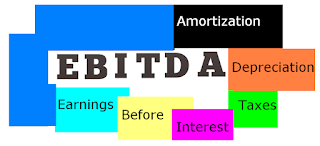EBITDA-Earnings before Interest, Tax, Depreciation and Amortization
 |
This is one of the most sort out data point for all the traders or investors to take a plunge into stocks of any company.
EBITDA is
self explanatory; it means that the Earnings that are taken into consideration
well before paying out any expenses. General understanding is that companies
only have rents and salaries as expenses but that’s actually a myth. Interests
on Loans for business, Taxes on earnings etc are also one of the biggest expenses
that a company needs to pay.
EBITDA
does not include these expenses into its calculations and hence not accounting
for the costs which do not impact its core operations .The traders use this as
a tool to compare two business models. Reason being a retail business or acorporate business might have different expenses and hence it will be difficult
to analyze if investing in the retail or manufacturing business would be easy.
But if the expenses are not considered then it makes the data so simple that taking
investment decisions becomes very simple.
Let’s
look at the example below;
Business Type: Retail
|
Cash Flow
|
Business Type:
Manufacturing
|
Cash Flow
|
|
Total Earnings
|
10,000,000
|
Total Earnings
|
20,000,000
|
|
Total Expenses(includes salaries, etc)
|
3,500,000
|
Total Expenses(includes salaries, interests etc)
|
6,000,000
|
|
Total Depreciation, Interest
|
500,000
|
Total Depreciation, Interest
|
800,000
|
|
Total Taxes
|
1,000,000
|
Total Taxes
|
2,000,000
|
|
Total Cash Earning
|
5,000,000
|
Total Cash Earning
|
11,200,000
|
The
above figure shows the EBITDA of the companies are 6,500,000 and 14,000,000 but
actual cash earnings differs by half.
Another
problem with EBITDA as it does not
include the details of when the cash has been exchanged but only what the
company decided on papers as this is not really showing the cash earnings.
Hence,
if someone looks at the EBITDA they will think Manufacturing business is good
investment whereas Retail is a better option considering they have less debt to
pay.



Comments
Post a Comment